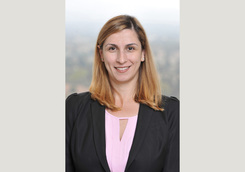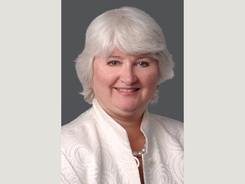As In-House Counsel Ramp Up Secondment Requests, How Are Firms Responding?
Secondments can benefit law firms, but often at great cost. As clients ramp up their requests, how are firms approaching their arrangements?
February 28, 2020 at 08:00 AM
11 minute read
 In rythm of modern business.
In rythm of modern business.
Morgan Stanley is the type of client that holds sway with law firms, so the global investment bank and financial services giant felt comfortable making a bold request of its service providers last year.
In keeping with the growing popularity of secondments in certain portions of the in-house community, the bank, which has been ramping up its own requests for secondees, went all-in, launching a formal secondee program. In doing so, it asked its outside law firms to send over one or two lawyers apiece for six months—at no cost to Morgan Stanley.
Every firm on the bank's preferred providers list agreed to the deal.
It's a testament to the gradual spread of secondment arrangements across the legal services spectrum—and the value they can deliver for both sides—that Morgan Stanley's request was well received. In this era of increasing client power, in-house counsel and the law firms they work with are breathing new life into the concept.
"When our outside lawyers gain greater exposure to Morgan Stanley attorneys and business professionals, and obtain deeper knowledge of our businesses and practice areas, we all reap the benefits," says Eric Grossman, the bank's executive vice president and chief legal officer.
Morgan Stanley's program brought in two waves of secondees, the first from January through June and the second from July through December, and proved to be a "tremendous success," Grossman says.
"One pro of a secondment is that we know that we are getting law firm stars—associates who are smart, eager to learn and enthusiastic," he says, noting that "it would be terrible business practice for a firm to send a subpar or average associate to work in-house at a client."
Wayne Spillett, head of legal and commercial operations for Vodafone Group in London, advises law firms to "think carefully about the right personality fit, as secondees that really chime well with an organization can fly when given the right opportunity."
At Morgan Stanley, where secondees are embedded in one of the firm's legal and compliance division practice areas, including litigation and intellectual property law, a law firm's willingness to participate in the program is a consideration when the bank hires outside counsel, Grossman says. But he doesn't view it as a one-way street.
"We hope that firms will be able to use access to our secondment program as a selling point in their own recruitment and retention programs," he says.
The Resource Gap
Global on-demand legal services company Axiom has seen interest in secondments spike in recent years, according to David Pierce, executive vice president of sales for the New York-based firm.
"It's hard for general counsel and law department managers to constantly match resources and work requirements," he says.
That resource-workload gap was apparent during the lead-up to the implementation of the European Union's General Data Protection Regulation, when Axiom saw a boom in demand for secondees, Pierce says. Companies wanted to bring GDPR experts in-house, get up to speed on the new regulations and then send the experts on their way.
"It's a really good example of the certain kind of bulge of work that's temporal and comes with the rollout of a new regulation where you need a certain skill set that you probably won't need for a period of years," Pierce says.
Axiom's lawyers, most of whom have in-house experience, typically handle what Pierce calls "run-the-company work," such as commercial contracts, privacy issues, technology transactions and licensing. He notes that they're also increasingly being hired to work on larger projects, including M&A deals and regulatory investigations.
"Companies are seeing more and more of a supply of in-house ready, seasoned lawyers who want to practice the way that Axiom makes possible," Pierce adds. "The more lawyers who do that, the more clients will come aboard and recognize this as a way they should be resourcing their team."
Beyond Cost
When LegalZoom general counsel Chas Rampenthal prepares to dive into a big legal project, he runs through a list of standard questions. Can the company handle the work internally? If not, how much will it cost and how long will it take to get it done externally? Then he compares his findings to a secondment.
"It's always on my mind," he says. "Cost is part of it, but it'll surprise you: Cost is not the main part of it."
While bringing a seconded lawyer aboard is typically less expensive than hiring traditional outside counsel—or, in some cases, free—the factor that usually tips the scale in favor of one option or the other is the stakes underlying the work at hand.
For bet-the-company litigation or initial public offerings, most companies go with traditional law firms, because being able to adapt based on need is more important than just saving money, Rampenthal says. "But when you know a project is finite and you have some in-house expertise to help manage it," he says, a secondment may be the best option. "Then the cost savings are just the cherry on top. What you gain is a nearly full-time 'employee' that you know you can count on to be there."
That's not to say that secondments have to be full time. Rampenthal has seconded lawyers to work for 10 hours a week. Others have worked from home.
"A lot of times these things go for as little as two or three months, but it could go for as long as two or three years," Rampenthal says. "And it's about as varied as there are law firms and lawyers out there."
 Chahira Solh of Crowell & Moring.
Chahira Solh of Crowell & Moring.Secondments vary in scope and duration, depending on the client, the firm providing the service and the size of the two entities involved. They can range from three months to a year, depending on the reason for the request. Lawyers may be on-site with the client or remote, and they may be full time or working with the client for only a couple days a week.
Firms with a larger associate pool can funnel out multiple secondment participants to a single company and dozens over the course of a year, whereas smaller firms may only be able to send one or two people out to a preferred client. But in all cases, secondment programs offer firms an opportunity to shore up an existing relationship and serve as a business development tool when courting a potential client. And the benefits are often more widespread, including the meaningful experience they provide for participating attorneys.
Chahira Solh, an antitrust partner at Crowell & Moring in Orange County, California, had a six-month secondment at United Airlines that she says was invaluable to her understanding of in-house legal departments and how to communicate with C-level corporate personnel. Her firm doesn't normally send partners on secondments, but United needed someone more senior to help guide strategic decisions and interact with its executives while one of its antitrust attorneys was on paternity leave. The experience gave her perspective on what general counsel and in-house teams deal with on a daily basis, and taught her how to be a more effective advocate for United and the rest of her clients, she says.
"It helped me become a better business adviser and lawyer, knowing how to communicate with a business team," Solh says.
There is plenty to be gained, but there is a cost associated with the endeavor for law firms. Secondment participants, if even for a few months, go from revenue generators to cost centers, something firms have to take into consideration when sidelining a part of the team that helps keep the lights on.
"[Secondments] aren't great for us financially," says Brian Donnelly, managing partner at San Francisco-based litigation firm Farella Braun + Martel. "But the experience the associates are getting is great for morale and we are trying to take the long view on this as a firm."
Ellen Dwyer, chairwoman of Washington, D.C.-based Crowell & Moring's executive committee and a partner in the firm's labor and employment group, says the firm often offsets the cost to clients by charging a discounted hourly rate for seconded lawyers, in recognition of "the important value that secondments provide" to the firm.
Debora De Hoyos, a finance partner and global client relationship leader at Mayer Brown, says that whether or how much a client pays for a secondee varies, as each client relationship and secondment program is unique. But, like Donnelly, she says the short-term financial hit is worth it in the long run.
A Growing Solution
De Hoyos says Mayer Brown has seen a modest rise in secondments in recent years: "It's not mushrooming, but it is growing." She attributes the growth, in part, to an evolution in the way companies develop and market their wares or services.
 Debora de Hoyos, with Mayer Brown.
Debora de Hoyos, with Mayer Brown."Over the past 15 to 20 years, corporations and financial institutions have gotten more sophisticated in their go-to-market strategies," De Hoyos says. "This has created dialogues between the client and the firm where they need to get to know each other better."
Donnelly says he has seen an uptick in requests for secondments as well, but he thinks it has more to do with the economic conditions in his firm's base in northern California.
"We have been doing this as long as I can remember," Donnelly says. "But there has been an uptick lately. The Bay Area is quite busy."
As a smaller firm, Farella can't afford to dedicate 30 to 40 associates to its secondment program like Mayer Brown and other large firms can. Two associates comprise nearly 4% of Farella's associate pool, making a bigger investment a challenge, but Donnelly still thinks the program is underused.
De Hoyos and Donnelly agree that secondment programs are beneficial from a client relations and educational perspective. But the driving force behind many secondments is the client's need to backfill a position due to leave. The more liberal parental leave options at many Bay Area companies make it an even more significant factor for Farella, Donnelly says.
Crowell's Dwyer says client requests for secondments have ramped up in the past decade, often tied to in-house staff going on leave. In addition to seeking help covering an existing workload, though, clients are turning to Crowell and other firms in hopes of getting exposure to and working with the firm's female and minority attorneys.
"This is really exciting to us," Dwyer says, "and a welcome evolution."
Solh, who is an immigrant of Middle Eastern descent, says United Airlines was excited to get the perspective of someone whose atypical Big Law background gives her a different way of thinking about problems. "It benefited both them and me to come in and add to their diversity," she says.
Parting Ways
When it was time for Solh to reintegrate back into day-to-day work at Crowell, the process wasn't nearly as rough as it could have been after the time away, she says.
"I was worried I'd feel like I was out of the loop or would need to catch up on client connections and work, but that didn't play out in reality," Solh says, thanks to a supportive team that kept her involved in key decisions, requests for proposal, and more.
The bond she formed with United also aided her return to practice.
"In many ways I felt like I came back ahead, because I had forged such a strong relationship with United Airlines while I was there, and it helped me hit the ground running when I returned to the firm full time," she says.
Firms can't ignore, however, the possibility that attorneys such as Solh might never come back after a fruitful secondment. Although it isn't commonplace, Crowell, Farella and Mayer Brown have each had lawyers leave for the companies they worked with on secondment.
"It happens once in a while," De Hoyos says. "Not every associate wants to work in a law firm. This can be a good change of pace for them."
It's a known risk. But just as law firms accept the assorted costs of secondments in search of the benefits they provide, it's a risk worth taking.
"We try and take a long view and get people the experience they want," Donnelly says. "Hopefully, they look back down the line and feel positive about it."
This content has been archived. It is available through our partners, LexisNexis® and Bloomberg Law.
To view this content, please continue to their sites.
Not a Lexis Subscriber?
Subscribe Now
Not a Bloomberg Law Subscriber?
Subscribe Now
NOT FOR REPRINT
© 2025 ALM Global, LLC, All Rights Reserved. Request academic re-use from www.copyright.com. All other uses, submit a request to [email protected]. For more information visit Asset & Logo Licensing.
You Might Like
View All
Testing Legal Authority, Trump Fires NLRB Chair, Leaving Panel Without Quorum
3 minute read
Spotify GC Steps Down, Opts to 'Step Away From Full-Time Corporate Life'
2 minute read
Law Firms Mentioned
Trending Stories
- 1Former U.S. Dept. of Education Attorney Suspended for Failure to Complete CLE Credits
- 2ArentFox Schiff Adds Global Complex Litigation Partner in Los Angeles
- 3Bittensor Hackers, Accused of Stealing Over $28 Million, Face Federal Lawsuit
- 4In Novel Oil and Gas Feud, 5th Circuit Gives Choice of Arbitration Venue
- 5Jury Seated in Glynn County Trial of Ex-Prosecutor Accused of Shielding Ahmaud Arbery's Killers
Who Got The Work
J. Brugh Lower of Gibbons has entered an appearance for industrial equipment supplier Devco Corporation in a pending trademark infringement lawsuit. The suit, accusing the defendant of selling knock-off Graco products, was filed Dec. 18 in New Jersey District Court by Rivkin Radler on behalf of Graco Inc. and Graco Minnesota. The case, assigned to U.S. District Judge Zahid N. Quraishi, is 3:24-cv-11294, Graco Inc. et al v. Devco Corporation.
Who Got The Work
Rebecca Maller-Stein and Kent A. Yalowitz of Arnold & Porter Kaye Scholer have entered their appearances for Hanaco Venture Capital and its executives, Lior Prosor and David Frankel, in a pending securities lawsuit. The action, filed on Dec. 24 in New York Southern District Court by Zell, Aron & Co. on behalf of Goldeneye Advisors, accuses the defendants of negligently and fraudulently managing the plaintiff's $1 million investment. The case, assigned to U.S. District Judge Vernon S. Broderick, is 1:24-cv-09918, Goldeneye Advisors, LLC v. Hanaco Venture Capital, Ltd. et al.
Who Got The Work
Attorneys from A&O Shearman has stepped in as defense counsel for Toronto-Dominion Bank and other defendants in a pending securities class action. The suit, filed Dec. 11 in New York Southern District Court by Bleichmar Fonti & Auld, accuses the defendants of concealing the bank's 'pervasive' deficiencies in regards to its compliance with the Bank Secrecy Act and the quality of its anti-money laundering controls. The case, assigned to U.S. District Judge Arun Subramanian, is 1:24-cv-09445, Gonzalez v. The Toronto-Dominion Bank et al.
Who Got The Work
Crown Castle International, a Pennsylvania company providing shared communications infrastructure, has turned to Luke D. Wolf of Gordon Rees Scully Mansukhani to fend off a pending breach-of-contract lawsuit. The court action, filed Nov. 25 in Michigan Eastern District Court by Hooper Hathaway PC on behalf of The Town Residences LLC, accuses Crown Castle of failing to transfer approximately $30,000 in utility payments from T-Mobile in breach of a roof-top lease and assignment agreement. The case, assigned to U.S. District Judge Susan K. Declercq, is 2:24-cv-13131, The Town Residences LLC v. T-Mobile US, Inc. et al.
Who Got The Work
Wilfred P. Coronato and Daniel M. Schwartz of McCarter & English have stepped in as defense counsel to Electrolux Home Products Inc. in a pending product liability lawsuit. The court action, filed Nov. 26 in New York Eastern District Court by Poulos Lopiccolo PC and Nagel Rice LLP on behalf of David Stern, alleges that the defendant's refrigerators’ drawers and shelving repeatedly break and fall apart within months after purchase. The case, assigned to U.S. District Judge Joan M. Azrack, is 2:24-cv-08204, Stern v. Electrolux Home Products, Inc.
Featured Firms
Law Offices of Gary Martin Hays & Associates, P.C.
(470) 294-1674
Law Offices of Mark E. Salomone
(857) 444-6468
Smith & Hassler
(713) 739-1250






